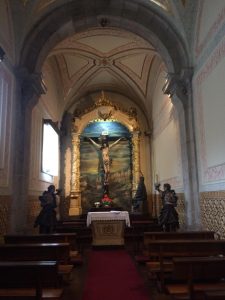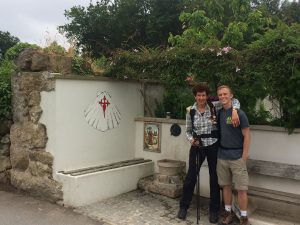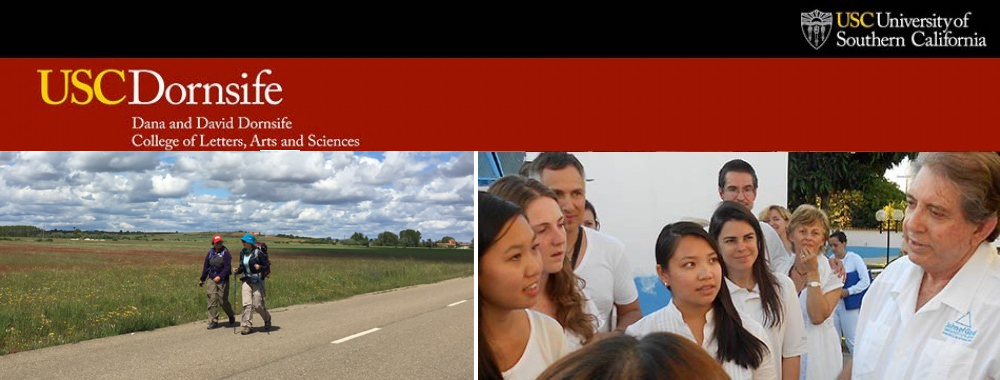Since the Way of Saint James is a Catholic pilgrimage with a history of prayer, penance, and devotion to God and His saints,

Church on the Camino
I am surprised to learn that many of the modern pilgrims that I have met on the Portuguese route are not Catholic. In fact, most of the people I have met are not religious at all.
What I have seen, however, is that people are spiritual—or have some sense of higher power connecting people together—but do not always identify with a specific faith tradition. A Californian couple in their thirties for example, they call themselves “spiritual” but “do not go to church every Sunday or anything like that”. They explain that they stop at the churches along the Camino and can appreciate their history and beauty without necessarily being
Christian or believing in what the church teaches.
Another 23 year old Portuguese man shared a similar sentiment regarding spirituality. Despite being raised Catholic by his mother as a child, he says that he is not religious. He quotes: “I believe in God, but do not do the institutional religion”. For him, he can acknowledge God without practicing a particular faith.
Although I met many people who told me a similar story of being “spiritual” but not religious, there are others who have special experiences while on the Camino that makes them a little more ambiguous with their religious identity. One 67 year old woman from the Netherlands told me that “on the Camino, I am Catholic,” even though she does not normally go to mass or identify herself in this way. She continues to say that she was raised Catholic so when she is on the Camino she cannot help but feel connected to that part of her life that is deep down in her heart.

Our friend Constance and Jacob on the Camino
Despite most people saying that they aren’t religious, (especially true of the Germans I met), there were some that did profess their Catholic faith (especially true for the Polish I met). One Irish man in his forties has been walking parts of the Camino for years and already completed the French route once before. He walks the Camino for holiday but explains that he is Catholic even though “[ Irish] society doesn’t value it”, as Catholicism is apparently no longer popular like how it used to be. He even mentioned that “I admire Americans since they are proud of whatever religion they are.” They do not even hide their religious status or the fact that they go to mass on their dating profiles out of embarrassment like some of his Irish friends do.
An elderly Polish man also has been walking the Camino for many years and is a devout catholic. I often see him sitting peacefully in little chapels along the way and gripping his rosary. He walks for religious purposes and used to think that people weren’t real pilgrims if they were not religious. But he has learned over the years that “everyone has their own pilgrimage” and that everyone’s Camino is as valid as the next person’s.
After meeting many people who are doing the Camino for recreational reasons with a sense of spirituality in the background, I came to the general consensus that maybe the Camino is not as religious, or Catholic as I once thought. Or maybe the Camino is different now than what is was like in the medieval ages where it seemed as though people were often times going on pilgrimage for their salvation or the salvation of a loved one.
But then again, maybe people from the past and people from 2018 all walk with similar intentions, but just call it something different. For instance, a lot of people I have talked to brought up the idea of a higher power and universal force. Is this really any different than the concept of a God, just being labeled something else? And many people walked for a sense of peace and community—something that many people turn to religion for. Maybe people understand spiritually and religion to be two different things, even though they can both be getting at a similar and deeper truth. And furthermore, as my Irish friend explained about people being embarrassed about claiming their Catholicism, maybe the people I met on the Camino do have a sense of religion but have not accepted it as their own or as something that they want to share with others.
I think that whether someone identifies as religious, spiritual, or nothing at all, the Camino is a space of people of all backgrounds to connect and experience the unity of “communitas”. That no matter what a pilgrim may believe, everyone can feel the power and comfort of the Camino.
